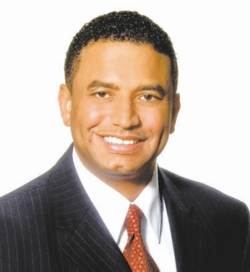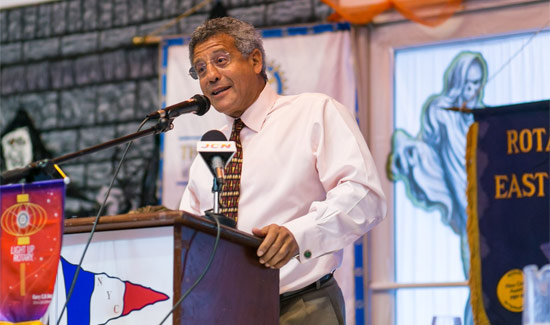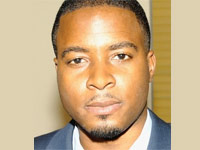 Last week, after an 11-year odyssey, the leadership of the Bahamas Democratic Movement (BDM) finally accepted political reality and disbanded, opting to join the Free National Movement.
Last week, after an 11-year odyssey, the leadership of the Bahamas Democratic Movement (BDM) finally accepted political reality and disbanded, opting to join the Free National Movement.
Meanwhile, the little known National Democratic Party (NDP) nearly imploded with recriminations flying back and forth between its leaders. Most Bahamians have little idea of the NDP’s existence, what it stands for, and who are its leaders.
So, it was bad news that the first time many people began to focus on that party, they found the NDP warring with itself and on the verge of political suicide. The party had already lost its leader, Dr. Andre Rollins, who eventually joined the opposition Progressive Liberal Party. Curiously, one of the NDP’s current leaders noted that he never really left the PLP. Go figure.
Despite these events, newly-independent Bamboo Town MP Branville McCartney seems destined to be the latest political figure to offer voters a ride on the third party merry-go-round. These rotating carousels mostly found on playgrounds and at carnivals give the illusion of forward movement typically simulating galloping horses that are decorative and brightly colored.
Merry-go-rounds often include repetitive, flashed images accompanied by a blaring musical loop pandering to the delight in hyper reality. But with each go round the delight diminishes and riders eventually want to get off the ride, bored by the amusement and ready to return to reality.
DIZZYING
As the executive producer-cum-choreographer-cum-main attraction on the latest third party merry-go-round, Mr. McCartney may be in for a dizzying ride. There is the ego-stroking thrill of leading his very own party. There is the background noise of those with the “pox on both sides” mindset arguing that Bahamians are hungry for a third party. Haven’t we been here before? Yes, and more than once.
Mr. McCartney and his acolytes will discover what a host of other third party enthusiasts from Paul Adderley to B. J. Nottage to Cassius Stuart discovered. The music on the merry-go-round will fade along with the accolades. The press and the public will become bored. The thrill of the new will become old news.
In the end, McCartney will go through the same harsh and punishing reality check of those third party founders who confused perennial voter frustration with actual support for a third party. Rather than reading the daily headlines, some of which pander to his ego in order to boost sales, Mr. McCartney might want to consider a few realities as he continues to build his merry-go-round.
He might begin by checking his flawed analogies such as: “Like America, who against all odds elected its first black president; like Trinidad, with its first female prime minister; and like Haiti, electing “underdog” musician Michel Martelly as president, it is my utmost belief that together, as a people united, Bahamians and The Bahamas, will join other countries around the world in redefining what is possible.”
Mr. McCartney should not confuse the possible with the highly improbable. Barack Obama in America and Kamla Persad-Bissessar, who became Trinidad and Tobago’s first female prime minister, did so through major parties, because in the end politics is the art of the possible.
Both Mr. Obama and Mr. Martelly were elected directly in presidential-style elections. Before he becomes president of The Bahamas, Mr. McCartney may wish to offer a plausible explanation as to how he plans to become prime minister.
Unfortunately, Bahamian history is not on his side. Good politicians and commentators should not always simplistically accept at face value what voters tell them.
REVEALING
There’s a revealing story told by a senior official of one of the major parties when he was canvassing with the MP of a certain constituency. They stopped in the yard of a couple who had nothing but praise for the sitting MP in front of the senior party official. But when the MP moved on to another house, the elderly couple pulled the senior party man aside and pleaded, “For God sake, can’t you find us a better representer?”
Listening to what voters are saying is not the same as understanding what they mean. Voters often talk out of both sides of their mouths. “Fix my roads, but don’t inconvenience me in the process.” “Yes, I want the government to maintain its level of services despite declining revenues because of the global financial meltdown. But don’t increase any of my fees to do so.”
The effects of the worldwide economic downturn have made many Bahamian voters frustrated and anxious, sometimes expressed in the form of “get rid of all of them PLP and FNM politicians”. But an expression of frustration does not easily or necessarily translate into a vote for a third party, as we have repeatedly seen since the advent of party politics in The Bahamas.
Bahamian voters are more sophisticated than many of the pundits, wishful/pseudo-thinkers and self-styled social elite. Bahamian voters are politically conservative in that they crave and reward stability and order in the political process, while punishing disunity and confusion in political parties.
The early FNM chose the theme “All Together” indicating that it understood the absolute imperative of a unified party. It wasn’t until the FNM got itself together and stopped splintering into various parties that it became more viable under the leadership of Kendal Isaacs.
With the strengthening of the two-party system, the FNM made impressive gains in the 1982 general election and in 1987 in an election clouded in significant irregularities. In 1992 the FNM became the government.
Having secured a stable two-party system for decades, the notion that the electorate will revert to or vote for a splintering of parties into a third — or even more — party system is a great delusion.
STABILITY
The electorate’s sophistication about and general acceptance of the two-party system isn’t about a great love for either of the major parties. But it is about a deep regard for the political stability that such a system has brought to The Bahamas. This stability has secured the country economically in terms of tourism, foreign investment, financial services and securing public sector borrowing.
The rumblings that some are hearing is the further deepening of voter sophistication and our democratic maturity. Many of these rumblings are by what may be an expanding group of independent voters who are interested in innovative thinking and practical responses regarding the nation’s challenges.
Whether the rumbling is coming from those affiliated or unaffiliated with one of the major parties, it is mainly about pressing for reform and renewal within the major parties — not a reactionary jump to a third-party system.
Ironically, just as our last two general elections were held on May 2nd, Canada will go to the polls in two weeks on that date. It will be for the fifth general election in 11 years, the result of third and fourth parties and the inability of the major parties to form a majority government.
In Australia’s general election last year, neither Julie Gillard’s Labour Party nor Tony Abbot’s Liberals gained a majority. The balance of power was held by a small number of independents, the majority of whom enabled Labour to form a weakened government.
The minority governments in Canada and Australia have found it difficult to push through various necessary reforms and legislation which have had to be watered down to ensure the government’s survival.
Now, consider the scenario that is being spun in some quarters of Mr. McCartney and his party capturing enough seats to have the balance of power. Of course, the likelihood of this is quite remote.
But just for the sake of imagining, imagine Mr. McCartney helping to form a coalition government with his third party. How stable would such a government be with Mr. McCartney who, in his brief time in office, has shown himself to be endowed with considerable ego but of rash and poor judgement? More next week.
By: Simon
Author of the “Front Porch” column in The Nassau Guardian and blogger on BahamaPundit.com



